How to Stay Connected While Traveling Vietnam
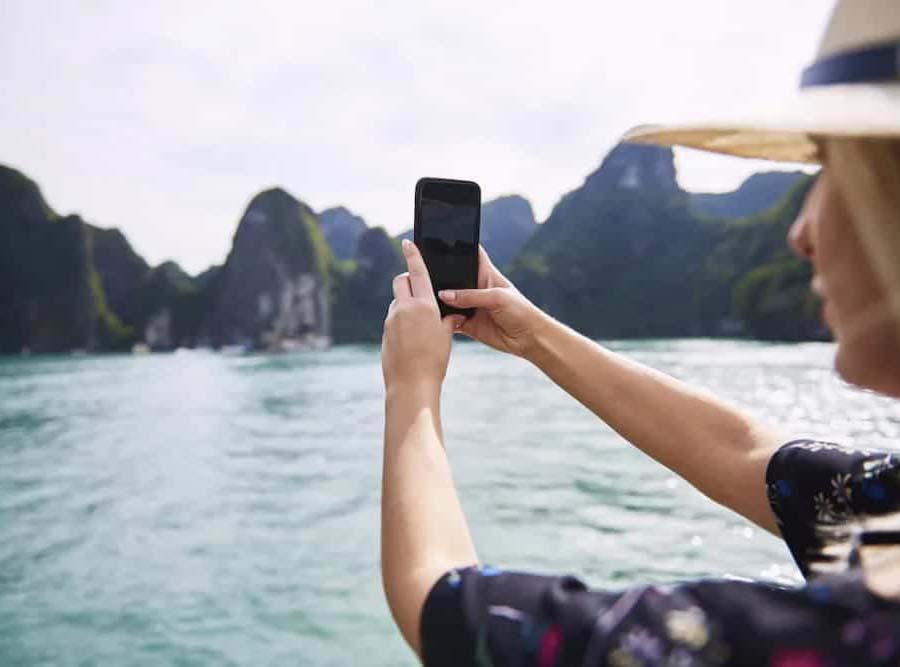
In the age of digital connectivity, staying connected while traveling is a priority for many. This is especially true when exploring a vibrant and diverse country like Vietnam.
Whether you're a digital nomad, a business traveler, or a tourist, staying connected in Vietnam is crucial. It allows you to navigate unfamiliar territories, keep in touch with loved ones, and even handle emergencies.
However, understanding the connectivity landscape in Vietnam can be challenging. From choosing the right mobile network operator to understanding the nuances of data plans, there's a lot to consider.
This guide aims to simplify that process. It gives full details on how to stay connected in Vietnam. It includes information on SIM cards, Wi-Fi access, and visa requirements for Vietnam.
This guide will help you stay connected during your trip to Vietnam. It is useful for first-time visitors and those who have been there before.
Understanding Connectivity in Vietnam
Connectivity in Vietnam is crucial for both comfort and safety during your travels. The country's infrastructure has seen significant improvements, ensuring better access to mobile and internet services.
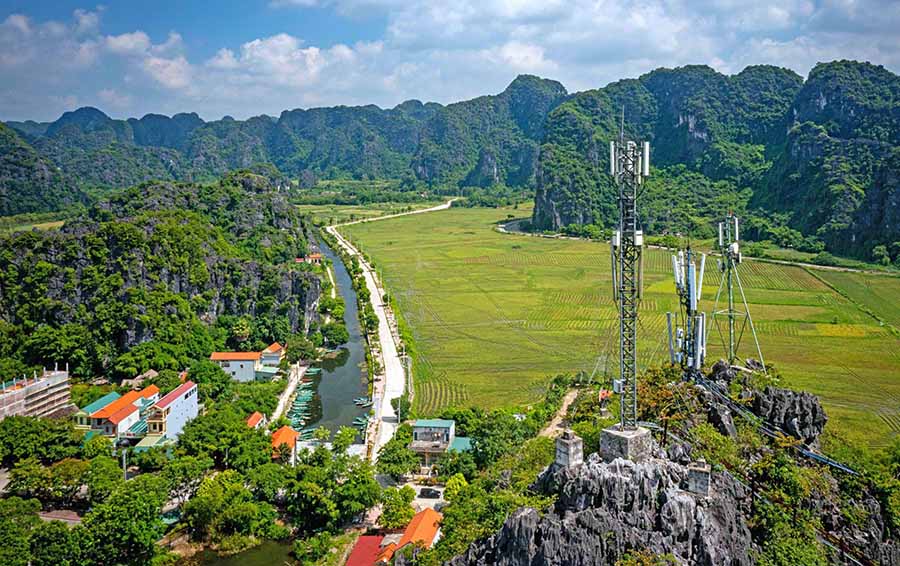
Urban areas, especially big cities like Ho Chi Minh City and Hanoi, boast excellent connectivity. You're likely to find solid signals and consistent internet speeds here. However, remote areas may still present some challenges, with lower coverage and slower speeds.
The types of connectivity available include mobile networks and widespread Wi-Fi access. Most businesses, hotels, and cafes offer free Wi-Fi, making it easy to connect to the internet.
Knowing which mobile network to choose is vital for seamless connectivity. Several operators provide various services and coverage options. Choosing the right one depends on your specific needs and travel plans.
Navigating these options ensures your time in Vietnam is both productive and enjoyable. Staying informed about the local connectivity landscape is your first step towards a trouble-free trip.
Mobile Network Operators in Vietnam
Vietnam offers multiple mobile network operators, each with unique strengths. The major players are Viettel, Vinaphone, and Mobifone. They provide extensive coverage and competitive rates.
Viettel is often praised for its broad coverage, making it a favorite among travelers. Vinaphone and Mobifone also offer robust services, especially in urban locations. Choosing the right operator depends on your destination and connectivity needs.
Most operators provide prepaid SIM cards, which are ideal for tourists seeking flexibility. These cards ensure easy access to calls, texts, and internet data during your Vietnam travel.
Purchasing and Registering SIM Cards
Purchasing a SIM card in Vietnam is straightforward. Upon arrival, you can find SIM cards at the airport or local shops. Having a passport is crucial, as it is required for registration.
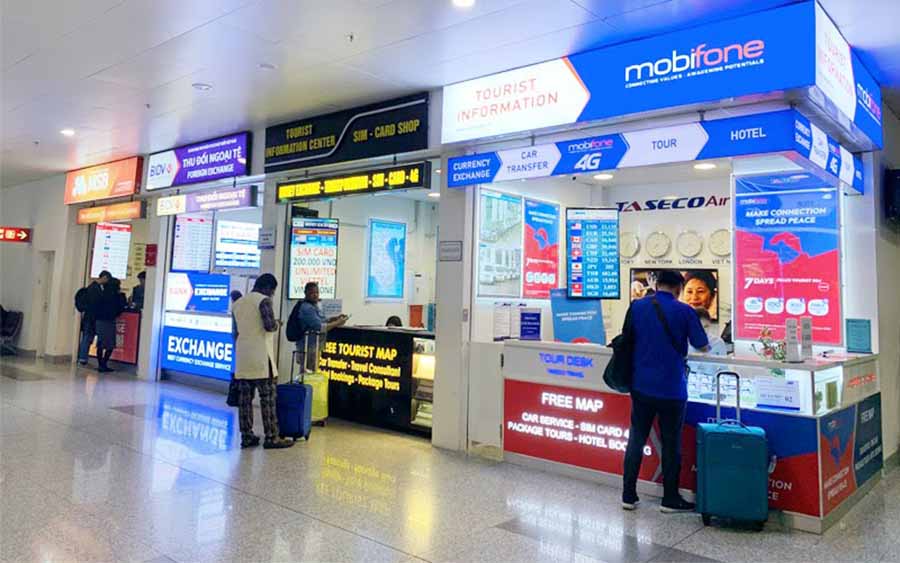
The registration process ensures compliance with local regulations. It helps providers track users for security reasons. This process is quick and usually handled directly by the seller.
Prices for SIM cards vary based on the operator and included data plans. Prepaid SIM cards offer flexible options tailored to different traveler needs.
For long-term stays, you might choose plans with more extensive data packages. For shorter visits, minimal plans can be both cost-effective and sufficient.
Being informed about the purchasing and registration process sets the foundation for seamless connectivity. With a SIM card in place, staying connected becomes hassle-free.
International Roaming vs. Local SIM Cards
International roaming allows you to use your home SIM card in Vietnam, but often at a high cost. Roaming charges can quickly add up, making this option less ideal for budget-conscious travelers.
On the other hand, local SIM cards present a cost-effective alternative. They provide the same connectivity services at significantly lower prices. This approach is preferable for those planning extended stays or extensive travel within Vietnam.
Choosing between roaming and a local SIM depends on your priorities. For convenience and lower expenses, a local SIM card is usually the better option. This choice ensures efficient and affordable communication throughout your journey.
Data Plans and Wi-Fi Access
In Vietnam, accessing the internet is straightforward and affordable. Many tourists opt for local SIM cards due to their budget-friendly data plans. Data plans typically offer generous amounts of data, ensuring easy browsing and social media use.
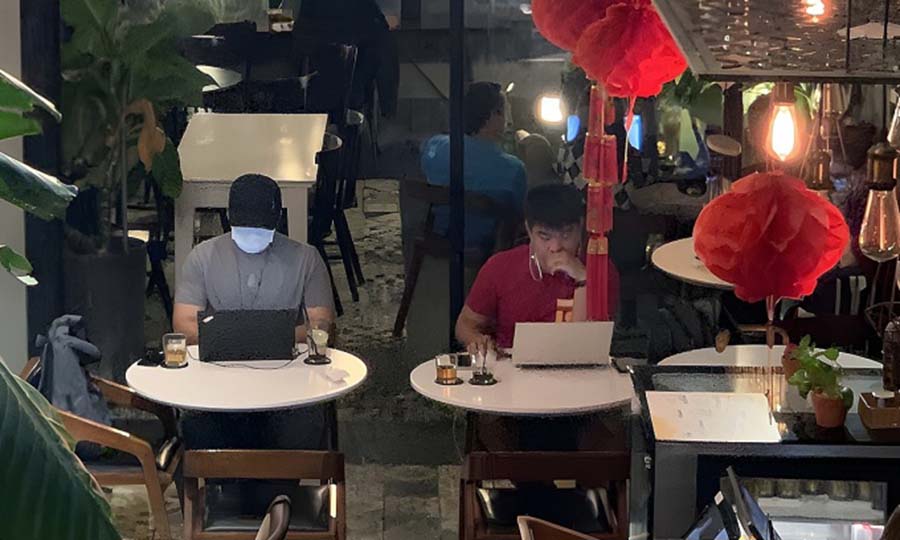
Most plans cater to various needs, whether you're a heavy data user or just require basic connectivity. It's worth comparing a few options before committing to a plan.
Wi-Fi access is widespread across Vietnam, making it easy to stay online. Most cafes, hotels, and restaurants provide free Wi-Fi to customers.
Always ensure network safety when using public Wi-Fi. Some networks may not be secure, posing a risk to personal data. A few precautions can help safeguard your digital privacy.
Utilizing secure connections, such as using trusted VPN services, is advisable. This not only protects your data but also ensures unrestricted internet access.
Finding the Best Data Plans for Tourists
Data plans in Vietnam offer something for every traveler. Whether you need basic connectivity or substantial data, there's a plan for you. Viettel, Mobifone, and Vinaphone are among the top providers.
Tourists generally benefit from the flexibility of prepaid plans. These plans offer competitive rates without long-term commitments, perfect for short stays.
When choosing a plan, consider your daily data needs. Review the cost, validity period, and coverage to find the right fit. This ensures you get good value during your Vietnam travel experience.
Wi-Fi Availability and Safety
Vietnam's urban areas are rich in Wi-Fi hotspots, ensuring internet access nearly everywhere. Whether in hotels, cafes, or public spaces, connecting is easy. This wide availability enhances the travel experience.
Despite its convenience, safety remains a concern. Not all networks guarantee secure connections, exposing users to potential risks. Use known and trusted networks to reduce safety issues.
Avoid sensitive transactions on public Wi-Fi to minimize risks. Using secure networks and practicing caution can help keep your information safe. These simple steps help protect your digital privacy on the go.
Using VPNs for Secure Internet Access
A virtual private network (VPN) is essential for secure browsing in Vietnam. VPNs encrypt data, ensuring safe internet use. They also help bypass any local restrictions on content.
Choosing a reputable VPN service is crucial. It ensures fast connections and reliable security features. Many popular VPNs offer user-friendly apps, easy to install on mobile devices.
Besides security, VPNs allow access to geographically restricted content. This can be especially useful for travelers wanting uninterrupted access to their usual websites. With a VPN, you maintain privacy and open access during your stay in Vietnam.
Tech Tips for Travelers in Vietnam
When exploring Vietnam, leveraging technology can greatly enhance your experience. Travel apps play a crucial role in seamless navigation and planning. They provide vital information about local attractions, dining, and transport options.
Besides travel apps, consider downloading language translation apps. These assist in communicating with locals and ease any language barriers. Simple phrases in Vietnamese can enrich your interactions.
Power banks are a must-have for keeping devices charged during long excursions. Vietnam's beautiful landscapes might distract you from checking your battery level. Having extra power available can be invaluable on busy days.
Device security is another priority for tech-savvy travelers. Keep gadgets secure to avoid theft or loss, especially in crowded areas. Protective cases and mindful habits make a big difference here.
Staying informed with local news apps helps navigate potential disruptions in your travels. It's wise to monitor local conditions, ensuring a safe and enjoyable journey.
Essential Travel Apps for Vietnam
Smartphones are indispensable when traveling. Downloading the right apps makes your journey smoother.
Here are some popular choices:
- Google Maps: For navigation and public transit info.
- Google Translate: Aids in quick language translation.
- XE Currency: For current exchange rates.
- TripAdvisor: Reviews and recommendations for attractions.
- Grab: Vietnam’s answer to Uber for rides and deliveries.
These apps simplify life on the road in Vietnam, offering valuable insights and services. They are reliable and widely used by travelers and locals alike.
Staying Connected in Remote Areas
Vietnam boasts vibrant cities and remote landscapes. Remote areas might pose connectivity challenges for travelers. It's essential to plan ahead when visiting such places.
Verify mobile coverage with your provider before setting off. Some carriers offer better rural coverage than others. It's wise to research network reliability in your intended destination.
Consider portable Wi-Fi devices for areas with spotty cell coverage. These can offer a solution when mobile networks are unreliable. This device ensures you stay connected even in Vietnam's secluded spots.
Managing Data Usage and Avoiding Fees
Managing data usage helps avoid extra charges. Monitor your consumption using your phone settings or a data-tracking app. Regular checks prevent surprise fees.
Opt for plans with data limits that match your needs. This ensures you don’t exceed your allowance. It’s also smart to disable app auto-updates on mobile data.
Rely on Wi-Fi when available, such as at hotels and cafes. Use these networks for heavy data activities like streaming and uploading. These habits help conserve data and cut costs, allowing stress-free internet use during your travels.
Visa and Legal Considerations
Before traveling to Vietnam, understanding the visa requirements is crucial. Different nationalities have varying visa rules, so check what applies to you. Planning ahead ensures a smoother entry process.
You can apply for a Vietnam visa online or upon arrival. Each option has its own process and timeline. Being prepared with the right documentation is key.
Technology also impacts your travel. It's important to know the legalities of communication device usage in Vietnam. Awareness helps you comply with local regulations.
Understanding cultural etiquettes related to tech use is helpful too. In Vietnam, it’s respectful to maintain considerate phone habits in public settings. Such practices enhance your travel experience.
Learning these aspects doesn't just prevent mishaps; it enriches your Vietnam journey. It allows you to navigate legalities confidently, focusing instead on exploring the country.
Vietnam Visa Requirements and Application Process
Securing a Vietnam visa is often the first step in travel planning. Requirements vary by nationality and purpose of visit. It's best to consult the Vietnam Embassy or consulate in your country.
Many travelers opt for the online e-visa system. This is a convenient process that requires filling out an application and payment. Confirmation typically arrives within days, making preparation straightforward.
On-arrival visas are also available at major airports. These require pre-approval via a visa service before departure. Having a printout of this approval letter speeds up the entry process.
Legal Use of Communication Devices
Communication device regulations in Vietnam are important to understand. Travelers should be aware of local internet censorship policies. Some websites and apps might be restricted or require a VPN for access.
Always secure personal information, especially on public networks. Vietnam has specific rules about privacy and security. Using a VPN is a good practice to maintain privacy and abide by laws.
Phone use etiquette is also significant. Keep phone calls discrete in public places, aligning with social norms. Respectful behavior ensures a positive interaction with locals and authorities alike.
Connectivity Challenges and Solutions
Travelers in Vietnam might face some connectivity challenges. Urban areas generally have strong signals, but rural zones may not. This discrepancy affects consistent internet access across the country.
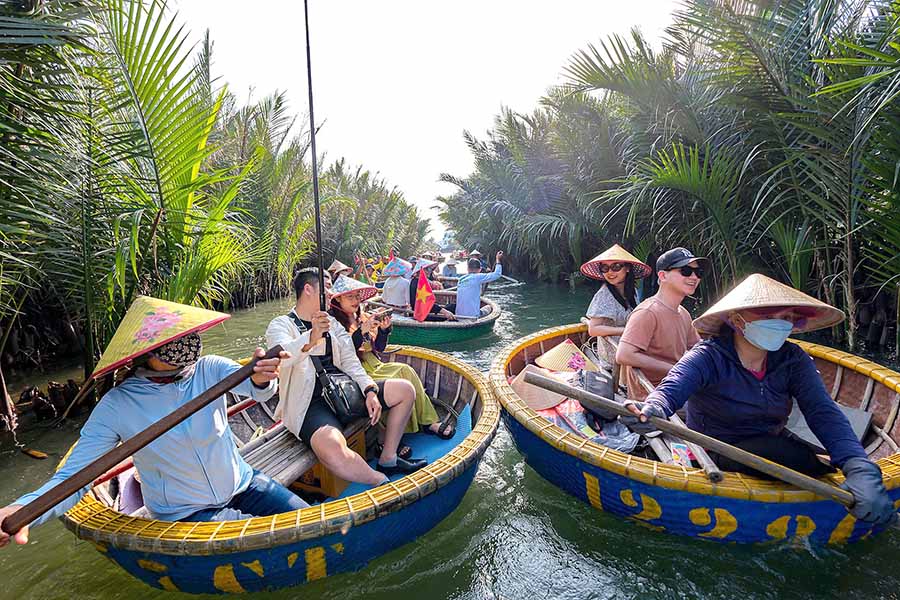
Language barriers can also complicate tech-related issues. Not all service providers have English-speaking staff. Preparing key phrases in Vietnamese can help bridge the communication gap.
Weather, too, can disrupt connectivity. During the monsoon season, heavy rains might affect mobile networks. Planning ahead with offline maps and backup communication options is wise.
Device security is another concern, especially in crowded places. Always keep your gadgets close and use lock screens. This helps prevent theft and keeps your data secure.
Staying informed with local news can provide insights into connectivity changes. Joining expat forums also offers real-time advice. Such strategies optimize your travel experience in Vietnam.
Troubleshooting Common Issues
Connectivity problems, though frustrating, often have simple solutions. If internet speeds slow down, resetting your mobile device can help. This simple trick often restores satisfactory speeds.
In rural regions, switching to a different network provider might be necessary. Not all operators offer complete coverage, so knowing alternatives is practical. Locals can be a resource for timely recommendations.
When language barriers arise, using a translation app helps. Online forums also provide assistance from other travelers. Leveraging these resources can save time and reduce stress during your trip.
The Future of Connectivity in Vietnam
Vietnam is continuously improving its connectivity infrastructure. Recent investments focus on enhancing internet speed and reach. This progress promises better experiences for travelers and locals alike.
Emerging technology trends, such as 5G, are being introduced. These developments will substantially enhance mobile internet capabilities. Faster connections will make everything more convenient.
However, staying informed about telecommunication policy updates is essential. Changes can affect what services are available to foreigners. Regularly checking government announcements ensures you remain prepared and informed.
Concluding Thoughts on Staying Connected
Staying connected in Vietnam enhances your travel experience. Whether for work or leisure, proper connectivity is essential. It ensures you can communicate and access vital information.
Planning ahead minimizes connectivity issues. From securing a local SIM to using travel apps, preparation is key. These steps help avoid unnecessary frustrations during your visit.
Enjoy the combination of technology and Vietnam's rich culture. Balance between them allows for a memorable trip. This thoughtful approach enriches your time in Vietnam.
Balancing Technology with Travel
Using technology responsibly enriches your journey. It provides useful tools for exploration and navigation. However, it's important to remain present.
Taking time to disconnect can lead to genuine experiences. Enjoying local culture without screens deepens your experience. It's all about mindful usage and finding balance.
Experience the present moment without digital distractions. Venture out, engage with locals, and savor the sights. These interactions will create lasting memories you will cherish.
Checklist for Connectivity Preparedness
Ensure a smooth trip with this simple connectivity checklist.
- Purchase a local SIM card at the airport.
- Download essential travel apps like maps and translators.
- Secure a VPN for internet safety.
- Keep a list of emergency contacts handy.
These steps help secure reliable connectivity. With this checklist, you're ready to enjoy a seamless travel experience. Plan before you go to avoid common pitfalls.
Final Tips and Key Takeaways
Prioritize connectivity as part of your travel prep. It greatly influences the success of your trip. Adopting the right tools helps manage your journey.
Be aware of your data usage to prevent extra fees. Knowing your plan's details protects against surprises. Staying informed ensures cost-effective connectivity.
Lastly, embrace Vietnam's beauty beyond screens. Engaging with its culture offers more than technology can. Balance is essential for a fulfilling travel experience.
Created: 1/5/2025 | Modified: 1/5/2025
